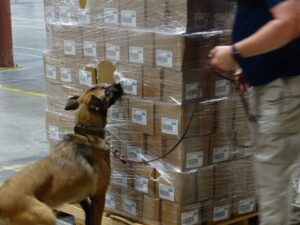Apr 22, 2024

As security threats in air cargo continue to change, ensuring the safety and security of transported goods must remain a top priority and mitigating measures will adapt accordingly. Among the items we screen for in air cargo, lithium-ion batteries have emerged as both indispensable assets and potential hazards. As the demand for these batteries continues to soar, so do the associated safety risks. These risks dramatically increase when these batteries are not declared as dangerous goods.
Lithium-ion batteries have become ubiquitous in modern life, powering everything from smartphones to electric vehicles. Their popularity stems from their lightweight, high-energy density properties, making them ideal for portable electronic devices; however, these same attributes equally pose inherent risks, especially within the context of air transportation.
One of the primary concerns surrounding lithium batteries in air cargo is the potential for thermal runaway, a phenomenon where the battery heats up rapidly and uncontrollably, leading to smoke, fire, or explosion. This risk is exacerbated when batteries are improperly manufactured, damaged, or improperly stored before shipment – or, to summarise when manufacturers are looking to cut costs and make cheap, unstable batteries.
Manufacturing genuine lithium-ion batteries requires stringent quality control measures and adherence to strict safety standards. Counterfeiters, driven by cost-cutting motives, often compromise on these essential aspects, increasing the likelihood of battery failures and safety incidents.
READ: Global K9 Protection Group boosts air cargo digitalisation with new Nexshore partnership
When lithium batteries are properly made and declared as dangerous goods, however, necessary safety protocols and precautions are implemented to mitigate any risks associated with the cargo; for example, fireproof containers or visible indicators to inform ground handlers. These precautions come at a cost, one that is avoided when no dangerous good declaration is made.
Manufacturers cutting costs on battery production may also be inclined to omit declarations to avoid associated fees and regulations, further compounding the risks.
To address these challenges, industry stakeholders must adopt proactive measures to detect and mitigate the risks posed by undeclared lithium batteries. This is where innovative solutions, such as canine screening, come into play.
Using specially trained canine teams to detect lithium batteries is the most efficient and most effective method of screening for them.
READ: Cargo security, shifting regulations, and emerging tech take centre stage
Imprinting canines with a single lithium odour enables efficient and reliable detection of undeclared lithium batteries. It is a proactive approach that not only enhances cargo security, but also complements existing screening procedures, providing an additional layer of protection against potential threats.
Leveraging available technology is paramount to streamlining these screening processes.
Collaboration between stakeholders, regulators, and technology providers will be critical in addressing these emerging challenges and advancing cargo security standards. By staying vigilant and proactive in our screening processes, we can collectively mitigate risks and uphold the integrity of air cargo transportation.
The management of lithium battery risks in air cargo requires a multifaceted approach that encompasses robust screening protocols, innovative technologies, and stringent regulatory oversight. By investing in proactive measures and leveraging the expertise of industry leaders like Global K9 Protection Group, the air cargo industry can continue to ensure the safe and efficient transportation of goods by air.
The post Mitigating the Risk appeared first on AIR CARGO WEEK.
Go to Source
Author: Chris Daniels
Latest Posts





